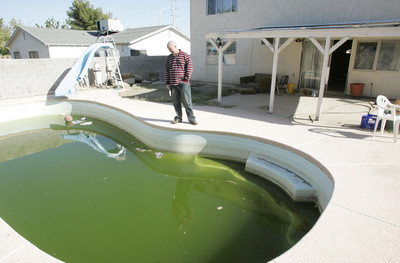Finding fortune in foreclosure

Troy Kearns struggled when he moved to Las Vegas two years ago and started his new job as a real estate agent. He was accustomed to a six-figure salary selling radio advertising in Seattle.
Kearns’ fortunes have turned now that he’s heading the foreclosure division for Gavish Real Estate. Last month, he sold about 30 real estate-owned homes and he has 46 others in escrow.
Nobody wants to talk about the 800-pound gorilla, but there’s an upside to the home foreclosure mess in Las Vegas.
“In ’06, we were getting our butts kicked. Now we’re having the time of our life,” the 30-year-old REO specialist said.
With the nation’s highest foreclosure rate, Las Vegas has become a hotbed of opportunity for related businesses.
John La Baum started Squatter Alert earlier this year, a company that monitors properties for lenders and investors.
More than half of the 23,400 homes for sale in Las Vegas are sitting vacant, an easy target for vandals and an open invitation for vagrants. Some observers say vacant homes increase the chances of neighborhood blight, fire hazards, criminal activity and further decline in home values.
La Baum checks foreclosed or vacant homes for unauthorized occupancy, damage, vandalism and graffiti. Upon foreclosure, he replaces all door locks, secures garage doors and performs simple repairs and maintenance, including initial yard service.
“We do a lot of things,” La Baum said. “The big thing right now is renter protection. We have a program for people renting homes that are actually in foreclosure.”
An alarming number of renters sign expensive lease agreements not knowing the homes they are about to rent are already in foreclosure, Steve Gold of SG1 Investments said.
Nearly 40 percent of foreclosures in large metropolitan areas involve rental properties that were purchased by investors who were hoping to “flip” them for a quick profit, but got caught up in the housing downturn, he said.
“They got stuck with them and are not adept at managing them and are slipping into foreclosure, often without the tenant’s knowledge of the impending loss of their home,” Gold said.
Although some real estate agencies have closed offices, reduced staff and reorganized in bankruptcy, others have been able to expand.
Agents such as Michael Krein of Nevada Real Estate Services who specialize in real estate-owned, or bank-owned, properties have become Goliaths in the industry. He has more than 1,000 REO listings and a 30-person support staff.
Things were slower in 2003 and 2004, only because mortgage defaults seldom entered foreclosure, he said. Most people still had equity in their homes and investors would snap them up before they went back to the bank, Krein said.
Krein said about 85 percent of foreclosure sales are going to “end users,” or primary residents.
“It’s good for a lot of people because prices got outrageous, so it’s a market correction,” he said.
The system for disposing of bank-owned homes is “clogged up,” Thomas Taylor of Desert Classic Properties said. Banks and mortgage companies have concentrated listings into the hands of a limited number of qualified brokers in Las Vegas.
“Agents are holding from 100 to 600 listings each — way, way too many to handle properly,” Taylor said. “These need to be spread out. A few escrow agents are likewise handling too many transactions to give efficient service.”
Some agents aren’t prepared to handle the large quantity of listings they received from the banks, REO specialist Tim Kelly of ReMax Pro’s Brodkin Group said.
He’s looked at properties that don’t even have a “For Sale” sign in the yard. Sometimes the staff representing the listing agent isn’t as “professional” as he’d like.
“They’re probably overworked and underpaid,” Kelly said. “Don’t get me wrong. Most agents are doing a great job, but some should just consider not taking listings that they cannot handle. Some Realtors don’t realize the manpower and financial outlay that’s needed when you get a large quantity of REO listings.”
Kearns saw the foreclosure wave coming when his personal speculative investments turned sour and decided to ride it out rather than battle it. He has about 150 REO listings and pending listings, including a four-bedroom, 1,530-square-foot home at 7234 Bridgeview Ave. The pool is polluted, the home is trashed, the garage is a disaster and the place smells like cat urine.
He’s going to suggest a list price to the bank of $155,000 to $175,000.
“We won’t put anything into it. We’ll sell it as is,” Kearns said. “It’ll look a lot better once we clean this place up. It needs paint, but it’s not structurally damaged. It’s got tile, it’s got a pool. If there’s pipes ripped out, that’s a problem.”
One homeowner facing foreclosure in Anthem dismantled his air conditioner and threw it into the swimming pool. About 20 percent of people in foreclosure will tear things up because they’re upset and feel they’ve been “screwed over,” but the other 80 percent know it’s coming and accept it, Kearns said.
Robin Camacho of American Realty Investments said she makes very little money working with some clients buying foreclosures. She recently had offers accepted on a $60,000 home and a $920,000 home and spent about an equal amount of time on each transaction.
“It’s all the same to me,” Camacho said. “My only goal is helping my client find the right home. I can’t tell you what my clients are paying for these, but suffice to say, there are some great deals on Las Vegas homes right now.”
Of the 19,684 single-family homes for sale on the Multiple Listing Service, 5,624 are bank-owned and 7,183 are short sales, listed for less than the mortgage owed. That means that nearly two-thirds of the inventory needs lender approval, Kearns said.
Contact reporter Hubble Smith at hsmith@reviewjournal.com or 702-383-0491.












